Class 9 Math: Sample Question Paper- 9 (With Solutions) PDF Download
SECTION -A
Questions 1 to 20 carry 1 mark each.
Q.1. The value of 
(a) 9
(c) 3
(b) 6
(d) none of these
Ans: Choice (c) is correct.


Q.2. If p(x) - x2 - 2√2x+1, then p(2 √2) is equal to
(a) 0
(b) 1
(c) 4√2
Or
If (x-2) is factor of p(x) = x3 - 2ax2 + ax-1, then value of a is :
(a) 0
(b) 7/6
(c) -7/6
(d) None of these
Ans: Correct option: (b)
Explanation :
On putting x = 2-√2 in given equation.
Or
Correct option: (b)
Explanation : ∴ (x - 2) is a factor of p(x)
⇒ By Factor Theorem, p(2) = 0
⇒ (2)3 - 2a(2)2 + a x 2 - 1 = 0
⇒ 8- 8a + 2a - 1 = 0
⇒ - 6a = -7
⇒ a=7/6
Q.3. Number of quadrant above x-axis are :
(a) 1
(b) 2
(c) 3
(d) 4
Ans: (b) 2
Q.4. If AB is a chord of length 24 cm of a circle with centre O and radius 13 cm, then the distance of the chord from the centre is
(a) 5 cm
(b) 6 cm
(d) 7 cm
Ans: (a)
As seen, ODB is a right angled triangle and by property, we know that, perpendicular from the centre to the chord bisects the chord in equal part.
Q.5. If P(A ∩ B ) = 0.4 then, 
(a) 0.8
(b) 0.04
(c) 0.08
(d) 0.6
Ans: Choice (d) is correct. [Using Demorgan’s law of sets]
[Using Demorgan’s law of sets]
= 1 - P(A ∩ B) = 1 - 0.4 = 0.6
Q.6. Three angles of a quadrilateral are 75°, 90°, and 75°. The fourth angle is
(a) 90°
(b) 95°
(c) 105°
(d) 120°
Ans: Correct option : (d)
Explanation: We know that the sum of angles in a quadrilateral = 360°
Therefore,
Fourth angle of the quadrilateral = 360° - (75° + 90° + 75°)
= 360° - 240°
= 120°
Q.7. In the given figure, D, E and F are the mid-points of the sides BC, CA and AB respectively.
If ar (BDEF) = x ar (ΔAFE), then the value of x is :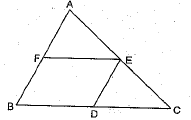
(a) 1/2
(b) 1
(c) 2
(d) 4
Ans: (c)
Q.8. A circle is of diameter 14 cm. Then, the length of wire to measure its length (total) for the purpose of making a boundary, is equal to
(a) 22 cm
(b) 33 cm
(c) 44 cm
(d) 55 cm
Ans: (c) Circumference of circle = 2πr = 2
= 44 cm
Q.9. The negation of the statement “Suresh lives in Bhopal or he lives in Mumbai” is :
(a) Suresh does not live in Bhopal or he does not live in Mumbai.
(b) Suresh does not live in Bhopal and he does not live in Mumbai.
(c) Suresh lives in Bhopal and he lives in Mumbai.
(d) Suresh neither lives in Bhopal nor lives in Mumbai.
Ans: Choice (b) is correct.
The negation of the given statement is Suresh does not live in Bhopal and he does not live in Mumbai.
Q.10. AD is a diameter of a circle and AS is a chord. If AD = 34 cm, AB = 30 cm, the distance of AS from the centre of the circle is
(a) 17 cm
(b) 15 cm
(c) 4 cm
(d) 8 cm
Ans: Correct option: (d)
Explanation :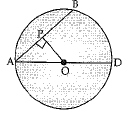
Draw OP ⊥ AB
We know that the perpendicular from the centre of the circle bisects the chord.
In right ΔOPA, we have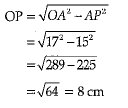
Questions 11 to 15 carry one mark each.
Q.11. 325 x 325 - 25 x 25 = .............
Ans: 105000
[∵ (325)2 - (25)2 = (325 - 25) (325 + 25) = (300) (350) = 105000]
Q.12. Two circles of the same radii are.........
Ans: Two circles of the same radii are congruent,
Q.13. 12 + 22 + 32 + ........... + n2 = ________.
Ans:
 is the sum of n terms of the special series 12 + 22 + 32 + .... n2
is the sum of n terms of the special series 12 + 22 + 32 + .... n2
Q.14. If a, b, c are the lengths of three sides of a triangle, then area of a triangle  where s = perimeter of triangle.
where s = perimeter of triangle.
Ans: False
Q.15. If P(E) = 0.65, then P(not E) = ..................
Ans: 0.35 [P(E) + P(not E) = 1 ⇒ P(not E) = 1 - P(E)]
Questions 16 to 20 carry one mark each
Q.16. If (x-3) is one factor of x2 + ax -4 = 0 and then find the value of a.
Or
If x = k2 and y = k is a solution of the equation x - 7y + 12 =0, find the value of k.
Ans: (x-3) is a factor of x2 + ax - 4 = 0 and
x2-4x+b = 0.
So, x=3, put in polynomials.
∴ (3)2 + a x 3-4=0
⇒ 9+3a-4=0
⇒ 3a+5=0
⇒ 
Or
Since, x = k2 and y = k is a solution of the given equation
∴ k2-7k+12=0
⇒ k2-4k-3k+12 = 0
⇒ k(k-4)-3(k-4) = 0
⇒ (k-4) (k-3) = 0
⇒ k-4 = 0 or k-3 = 0
∴ k=3, 4
Q.17. 
Ans: 


Q.18. The angles of a quadrilateral are in the ratio 2:3:6:7 . The largest angle of the quadrilateral is ............
Ans: Let the angles of the quadrilateral be 2x°, 3x°, 6x°, 7x°.
∴ 2x° + 3x° + 6x° + 7x° = 360°
[Angle sum property of quadrilateral]
or, 18x° = 360°
or, x°= 20°
∴ Largest angle - 7x = 7 x 20° = 140°
Q.19. For what value of k, is the polynomial p(x) = 2x3 - kx2 + 3x + 10 exactly divisible by (x + 2)?
Ans: Here, p(x) = 2x3 - kx2 + 3x + 10
Since (x + 2) divides p(x) exactly
∴ P(-2) = 0
⇒ 2(-2)3 - k(-2)2 + 3(-2) + 10 = 0
⇒ -16 - 4k - 6 + 10 - 0
⇒ - 4k - 12 = 0
⇒ 
Q.20. A cone, a hemisphere and a cylinder stand on equal bases and have the same height.
Then, find the ratio of their volumes.
Ans: Let radius of hemisphere is r.
⇒ 
Volume of hemisphere, 

SECTION - B
Questions 21 to 26 carry two marks each
Q.21. Express in the form a + ib :
Ans: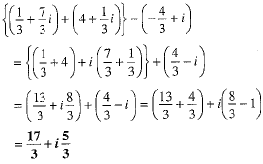
Q.22. In the adjoining figure, we have AB = BC, BX = BY. Show that AX = CY (using appropriate Euclid's axiom)
Ans: Given AB = BC ... (i)
and BX = BY ... (ii)
Subtract (ii) from (i)
⇒ AB - BX = BC - BY
Now, by Euclid's axiom 3, we have If equals are subtracted from equals, the remainders are equal.
Hence, AX = CY
Q.23. In the Figure, we have ∠1 - ∠3 and ∠2 - ∠4. Shaw that ∠A =∠C.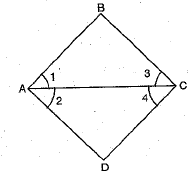
Or
In the given figure, if ∠1 = ∠3, ∠2 = ∠4 and ∠3 = ∠4, write the relation between ∠1 and ∠2, using an Euclid's axiom.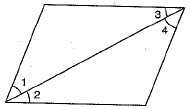
Ans: Here, ∠1 = ∠3 ...(i)
and ∠2 - ∠4 ...(ii)
Adding (i) and (ii), we have
∠1 + ∠2 - ∠3 + ∠4
=> ∠A = ∠C
[∴ Euclid’ s second axiom says, if equals be added to the equals, the wholes are equal]
Or
Here, ∠3 - ∠4 , ∠1 = ∠3 and ∠2 = ∠4. Euclid’ s first axiom says, the things which are equal to equal thing are equal to one another. So ∠l = ∠2.
Q.24. In game period, the teacher of Meerut Public School decided to play the puzzle game. For this game, firstly the teacher draws a geometrical figure on the ground, which is shown as below.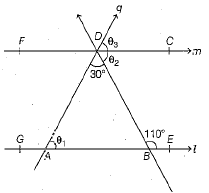
Here, line l is parallel to m and q is a transversal line. While drawing this figure, the teacher have no scale for measuring this length, but they know the side which is opposite to the smallest angle, is smaller and the side which is opposite to the largest angle, is larger. In this game, the teacher invite the two students Vicky and Vishal and said to them that especially Vicky stands on point A and Vishal stands on point B, respectively (assume that both have same space of walking).
Find the angle θ1,θ2 and θ3 as shown in figure.
Ans: In the given figure,
∠ABD + ∠DBE = 180° [by linear pair axiom]
⇒ ∠ABD + 110° =180° [∴ ∠DBE = 110°]
⇒ ∠ABD = 180°-110° =70° ...(i)
In AABD,
∠ABD + ∠DAB + ∠BDA = 180°
⇒ θ1 + 70° + 30° = 180° [from Eq. (i)]
θ1 =180° -100° = 80°
As I||m, so sum of the two interior angle is 180°
∴ θ2 + ∠DBE =180°
⇒ θ2 + 110° =180°
⇒ θ2 =70°
As I||m, ∠FDA = ∠DAB [alternate interior angles]
⇒ θ2 =70°
Also, ∠HDC = ∠FDA [vertically opposite angles]
⇒ θ3 =∠FDA =80°
Hence, angles are θ =80°, θ2 =70° and θ3 = 80°.
Q.25. Draw the Venn diagram to illustrate ‘All the students who study Mathematics also study English but some students who study English do not study Mathematics’. If E is the set of students studying English in a school, M is the set of students studying Mathematics in the same school, U is the set of all students in that school.
Ans: Venn diagram :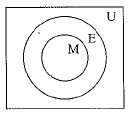
Or
Let A be the set of first twelve natural numbers and let R be a relation on A defined by (x,y) ∈ R ⇔ x + 2y = 12, i.e, R = {(x, y) : x ∈ A ,y ∈ A and x + 2y = 12}.
Express R and R-1 as sets of ordered pairs. Also determine domain and range of R and R-1.
Ans: We have
where A = {1, 2, 3, 4, 5, 6, 7, 8, 9, 10, 11, 12}
This shows that 1 is not related to any element of A. Similarly, we can see that 3,5,7,9,11 and 12 are not related to any element of A under the defined relation.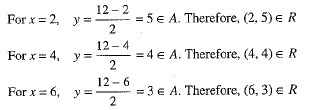

Thus R = {(2, 5), (4, 4), (6,3), (8,2), (10,1)}
⇒ R-1 = {(5, 2), (4,4), (3 ,6), ( 2 ,8), (1 ,10)}
Clearly, Domain (R) = {2,4,6,8,10} = Range (R-1) and, Range (R) = {5,4,3,2,1} = Domain (R-1)
Q.26. The diameter of the two right circular cones are equal if their slant heights are in the ratio 3 : 2, then what is the ratio of their curved surface areas ?
Ans: Let the radii and slant heights of two right circular cones are r1, l1 and r2 l2 respectively. ∴ Ratio of their Curved Surface Area
SECTION - C
Questions 27 to 34 carry 3 marks each
Q.27. Prove by using the principle of mathematical induction for all n ∈ N that:
Ans: Let P(n) be the given statement, i.e.,
Step 1. For n-1,
L.H.S. of P(1)= 12 = 1

Thus, P(n) is true for n = 1.
Q.28. Determine the point on the graph of the linear equation 2x + 5y =19, whose ordinate is  times its abscissa.
times its abscissa.
Ans: Let the abcissa of the point be a, then ordinate will be 3/2a
So the coordinate of the point will be 
Therefore,  is a solution of the equation
is a solution of the equation
2x + 5y = 19.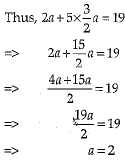
So, Abscissa of the point = 2
So, Co-ordinate of the point is (2,3)
Q.29. Prove that among all the chords of a circle passing through a given point inside the circle that one is smallest which is perpendicular to the diameter passing through the point.
Or
Two circles intersect at two points B and C, see given figure. Through B, two line-segments ABD and PBQ are drawn to intersect the circles at A, D and P, Q respectively. Prove that : ∠ACP = ∠QCD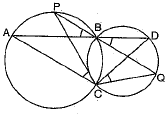
Ans: Let P be the given point inside a circle with centre O. Draw the chord AB which is perpendicular to the diameter XY through R Let CD be any other chord through R Draw ON perpendicular to CD from 0. Then AONP is a right triangle (see fig.). Therefore, its hypotenuse OP is larger than ON. We know that the chord nearer to the centre is larger than the chord which is farther to the centre.
Therefore, CD > AB. In other words, AB is the smallest of all chords passing through P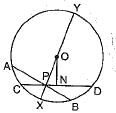
Or
Since angles in the same segments of a circle are equal
∴ ∠ACP = ∠ABP ...(i)
Similarly, ∠QCD = ∠QBD ...(ii)
Also, ∠ABP = ∠QBD ...(iii) [vert. opp. ∠s]
From (i), (ii)a nd (iii), we obtain
∠ACP = ∠QCD
Q.30. Write the coordinates of the vertices of a rectangle, whose length and breadth are 6 units and 3 units respectively, one vertex at the origin, the longer side lies on the F-axis and one of the vertices lies in the II quadrant. Also, find the area of the rectangle.
Ans: Let us draw the coordinate axes XOX' and YOY', and choose a suitable units of distance on the axes.
Let 1cm = 1 unit.
Mark a points on Y-axis at a 6 units distance in positive direction of Y-axis and mark a point C on X-axis at a 3 units distance in negative direction of X-axis. Now, draw a perpendicular line from C and A, which meets at a point B.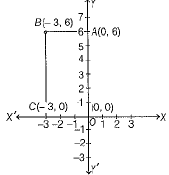
Thus, we get the rectangle OABC whose vertices are O(0,0), A(0, 6), B(-3, 6) and C(-3, 0).
∴ Area of rectangle = Length x Breadth
∴ Area of rectangle OABC = 6 x 3 = 18 sq units
Q.31. If P = {9 ,4 ,25} and Q = {1 , 2 , 3 , 5, - 2, - 3, - 5} If is defined from P to Q by R = [(x, y) : x = y2, x ∈ P , y ∈ Q].
(i) Write this relation in Roster form.
(ii) Draw arrow diagram for the above relation.
(iii) What is its domain, range and codomain ?
Ans: Relation R = {(x, y ) : x = y2, x ∈ P, y ∈ Q} from set P = {9, 4, 25} to Q = {1, 2, 3, 5, - 2, - 3 , - 5} can be described in Roaster form as :
R = {(9, 3), (9, -3), (4, 2), (4, -2), (25, 5), (25, -5)}
(ii) Relation R = {(9, 3), (9, -3), (4, 2), (4, -2), (25, 5), (25, -5)} from set P = {9, 4, 25} to set Q = {1,2, 3, 5, -2, -3, -5} can be represented by the following arrow diagram :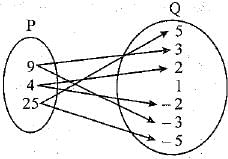
(iii) The domain of R is {9, 4, 25}
The range of R is {-5, -3, - 2, 2, 3, 5}
The co-domain of if is {1, 2, 3, 5, -2, -3, -5}
Q.32. If two circles intersect in two points, prove that the line through their centre is the perpendicular bisector of the common chord.
OR
Prove that the quadrilateral formed by the internal angle bisectors of any quadrilateral is cyclic.
Ans: Given: Two circles having centre P and Q respectively.
To Prove : PQ ⊥ AB and AC = BC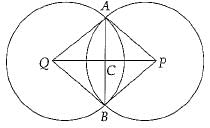
Construction : Join AQ, BQ, AP and BP
Proof: ΔAQP and ΔBPQ
PQ = PQ (common side)
AQ=BQ (radius of circle)
AP=BP (radius of circle)
In ΔAQC and ΔBQC
∠AQP = ∠BQP (proved)
AQ = BQ (radius of circle)
QC = QC (common side)
Hence, PQ bisect the common chord AB
∴ AC - BC (c.p.c.t.).. .(i)
[∴ Hence common chord bisect by the line segment PQ.]
Also, ∠ACQ+∠BCQ =180° (Linear pair)
2∠ACQ - 180° ∠ACQ = 90°
∴ PQ⊥AB ...(ii)
Thus line through their centre is the perpendicular bisector of the common chord.
Hence Proved.
OR
Let ABCD be a quadrilateral in which the angle bisectors AH, BF, CF and DH of internal angles of A,B,C and D respectively form a quadrilateral EFGH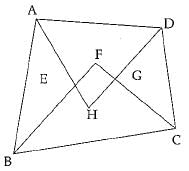
To prove : EFGH is a cyclic quadrilateral i.e

[∴ Angles A and B are bisector angles] Similarly ∠FGH = ∠CGD
[∴ Angles C and D are bisector angles]
On adding Eqs (i) and (ii), we get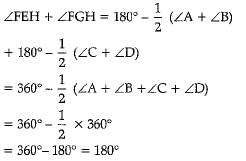
It implies that sum of opposite angles of a quadrilateral is 180°
Hence, it shows that quadrilateral EFGH is cyclic quadrilateral.
Q.33. Factories: x3+6x2+11x+6
Or
If 2x3 + ax2 + bx - 6 has (x-1) as a factor and leaves a remainder '2’ when divided by (x-2). Find the values of ‘a' and ‘b’.
Ans: Consider f(x)x3+6x2+11x+6
Clearly, constant term is 6
The factors of 6 are ±1, ±2, ±3, and ±6
By Trial method, we find that
f(-1) = (-1)3+6(-1)2+11(-1)+6
= -1+6-11+6=0
∴ x + 1 is a factor of f(x)
Now, divide f(x) by x + 1, we have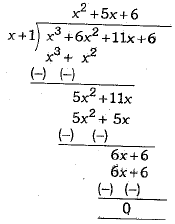
∴ f(x) = (x+1) (x2+5x+6)
= (x+1) [x2+2x+3x+6]
= (x+1) [x(x+2) + 3(x+2)]
= (x+1) (x+2) (x+3)
Or
Consider f(x) = 2x3+2x2+bx-6
As (x-1) is a factor of f(x). So by Factor Theorem,
f(1) = 0
∴ ⇒ f(1) = 2(1)3 + a(1)2 + b(1) - 6
= 2+a+b-6 = 0
⇒ a+b-4= 0 ...(i)
Also, it leaves remainder ‘2’ when divided by (x - 2). So by Remainder Theorem, f(2) = 2.
∴ f(2) = 2(2)3 + a(2)2 + b(2) - 6=2
⇒ 2 x 8+a x 4+b x 2-6=2
⇒ 16 + 4a + 2b - 6 =2
⇒ 4a+2b+8 =0
⇒ 2a + b + 4 =0 ...(ii)
From (i) and (ii) we have
2a - a + 8 =0
⇒ a=-8
and -8 + b - 4 =0
⇒ b=12
Hence, the values of a and b are - 8 and 12.
Q.34. The internal and external diameters of a hollow hemispherical vessel are 24 cm and 25 cm, respectively. The cost to paint 1 cm2 the surface is Rs 0.05. Find the total cost to paint the vessel all over. 
Ans. Let the external and internal radii of the hemispherical vessel be R cm and r cm, respectively.
Then, R = 12.5cm and r = 12 cm
Now,
Area of outer surface = 2πR2
Area of the inner surface = 2πr2
Area of the ring at the top = πR2 - πr2
Total area to be painted = (2πR2, + 2πr2 + πR2 - πr2)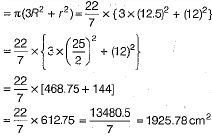
∴ Cost of painting = Rs (1925.78 x 0.05)=Rs 96.28
SECTION - D
Questions 35 to 40 carry 4 marks each
Q.35. In a survey of 25 students, it was found that 15 had taken Mathematics, 12 had taken Physics and 11 had taken Chemistry, 5 had taken Mathematics and Chemistry, 9 had taken Mathematics and Physics, 4 had taken Physics and Chemistry and 3 had taken all the subjects. Find the number of students that had taken
(i) only Chemistry
(ii) only Mathematics
(iii) only Physics
(iv) Physics and Chemistry but not Mathematics
(v) Mathematics and Physics but not Chemistry
(vi) only one of the subjects.
Ans: Let M, P and C denotes the set of students who had taken Mathematics, Physics and Chemistry respectively, then we have
(i) Number of students who had taken only Chemistry








(ii) Number of students who had taken only Mathematics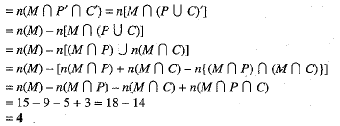
(iii) Number of students who had taken only Physics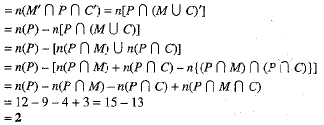
(iv) Number of students who had taken Physics and Chemistry but not Mathematics
(v) Number of students who had taken Mathematics and Physics but not Chemistry
(vi) Number of students who had taken only one of the subjects
Q.36. Factories : 6x3 - 5x2 - 13x 4- 12
or
Ans: Let p(x) = 6x3 - 5x2 - 13(1) + 12
If x =1
Then p(1) = 6(1)3 - 5(1)2 -13(1) + 12
= 6 - 5 - 1 3 + 12
= 18 -18 = 0
∴ (x - 1) is a factor of given polynomial p(x) 1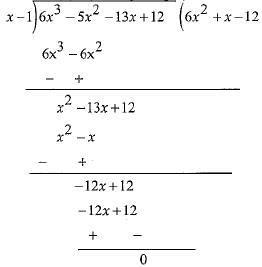
6x3 - 5x2 - 13x + 12 = (x-1)(6x2 + x-12)
= (x -1) {(6x2 + 9x - 8x -12)}
= (x-l){3x(2x + 3)-4(2x + 3)}
= (x -1) (2x + 3) (3x - 4)
∴ 6x3 - 5x2 - 13x + 12 = (x -1) (2x + 3) (3x - 4)
Or
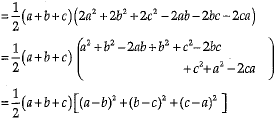
Q.37. In the given figure, ABCD is a square. ΔDEC is an equilateral triangle. Prove that : 
(ii) AE = BE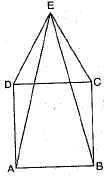
ΔABC and ΔDBC are two isosceles triangles on the same base BC and vertices A and D are on the same side of BC (see fig.). If AD is extended to intersect BC at Pf show that :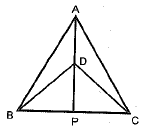

(iii) AP bisects ∠A as well as ∠D
(iv) AP is the perpendicular bisector of BC.
Ans: (i) Here, ABCD is a square and ΔDEC is an equilateral triangle. In square ABCD, AB = BC = CD = AD and each angle is 90°. In equilateral triangle DEC, DE = DC = EC, each angle is 60°
Consider ΔADE and ΔBCE, we have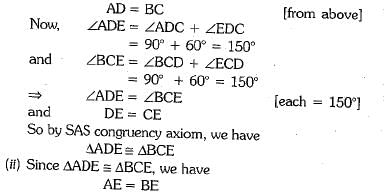
[by c.p.c.t.]
Or
Given : ΔABC and ΔDBC are isosceles triangles having common base BC, such that
AB = AC and DB = DC.
To Prove :(i) ΔABD ≅ ΔACD
(ii) ΔABP ≅ ΔACP
(iii) AP bisects ∠A as well as ∠D
(iv) AP is the perpendicular bisector of BC.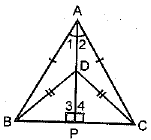
Proof : (i) Consider ΔABD and ΔACD, we have
AB = AC [given]
BD - CD [given]
AD - AD [common]
∴ By SSS congruence axiom, we have
In ΔABP and ΔACR we have
AB = AC [given]
∠1 = ∠2 [already proved above]
and AP = AP [common]
∴ By SAS congruence axiom, we have
∴ ΔABP ≅ ΔACP
(iii) ∠1 = ∠2
⇒ AP bisects ∠A ...(i)
⇒ AP bisects ∠D. [by c.p.c.t.]
(iv) As BP = CP. [by c.p.c.t.]
and ∠3 = ∠4
But ∠3 + ∠4 = 180° [ ∴ linear pair]
Hence, AP is the perpendicular bisector of BC.
Q.38. There are two friends Swati and Sapna who live in a village. Their common friend Monika fell ill. She was admitted in a hospital. Swati and Sapna decided to help Monika. Swati contributed as much money as the fifth root of the cube of amount contributed by Sapna. If the product of amount distributed by two friends is Rs 390625, then find the contribution of each friend.
Ans: Let the amount contributed by Sapna be Rs x.
Then, the amount contributed by Swati be (x)3/5.
According to the question,
x(x)3/5 = 390625
⇒ x1+3/5 = 390625 [∴xa . xb = xa+b]
⇒ x8/5 = 390625
Now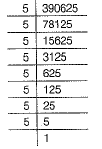

Hence, Sapna's contribution is Rs 3125 and Swati’s contribution is Rs 125.
Q. 39. Find the term independent of x in the expansion of 
Ans: Let Tr+1 denote the (r + 1) the term in the expansion of 
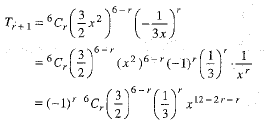

Let Tr + 1 be the term independent of x in the expansion 
This term, will be independent of x, if the power of x is zero,
i.e., 12 - 3r = 0
⇒ r = 4
Substituting r = 4 in (1), we get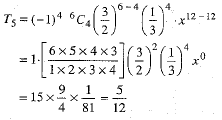
Hence, 5th term is independent of x and is given by 5/12.
Or
If the coefficients of ar-1, ar and ar+1 the expansion of (1 + a)n are in arithmetic progression, prove that
n2-n(4r + 1) + 4r2 -2=0.
Ans: We know that: The (r + 1) the term in the expansion of (1 + a)n is nCrar ⇒ The coefficient of ar in the expansion of (1 + a)n is nCr
∴ The coefficients of ar-1, ar and ar + 1 in the expansion of (1 + a)n are nCr-1, nCr and nCr+1,respectively.
It is given that: nCr-1; nCr and nCr+1 are in A.P.
∴ Cr-1+nCr+1 = 2nCr
⇒ 
⇒ 


Q.40. Draw a histogram of the weekly expenses of 125 students of a school given below :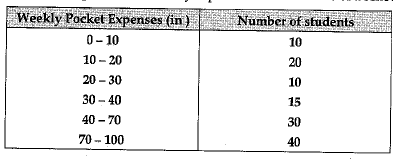
Ans: Adjusted Frequency
Here minimum class size=10-0=10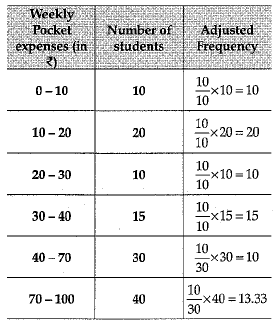
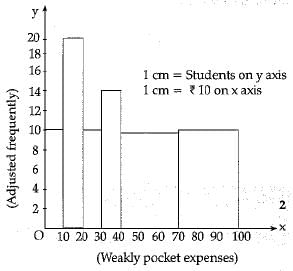
FAQs on Class 9 Math: Sample Question Paper- 9 (With Solutions)
| 1. What is the format of the Class 9 Math Sample Question Paper- 9? |  |
| 2. How can the Class 9 Math Sample Question Paper- 9 help in exam preparation? |  |
| 3. Are the solutions provided in the Class 9 Math Sample Question Paper- 9 accurate and reliable? |  |
| 4. Can the Class 9 Math Sample Question Paper- 9 be used for self-study? |  |
| 5. Is the difficulty level of the Class 9 Math Sample Question Paper- 9 suitable for the actual exam? |  |














